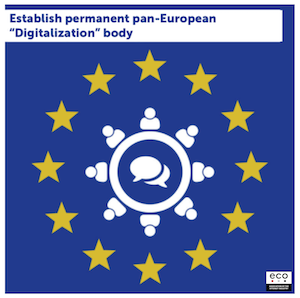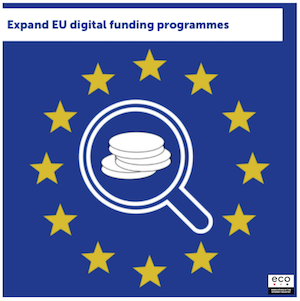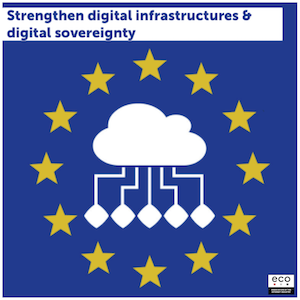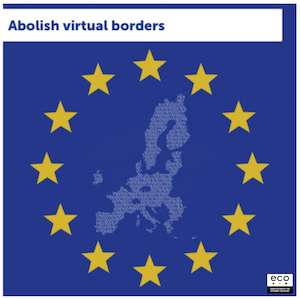- eco draws up a 6-point catalogue of requirements from the Internet industry for the strengthening of Europe as a digital location
Berlin, 8 May 2020 – The Internet industry is gaining increasing significance for the economy as a whole. The industry also promotes value creation in other sectors, and thus guarantees the innovation capacity of Europe as a business location. As such, the Internet industry is an important driver of Europe’s overall economy. The European economy as a whole stands to benefit from a strong Internet industry in the long term.
To ensure that the European Internet industry also recovers quickly from the consequences of the current Corona crisis, it is crucial that the right economic policy course is set now for the future.
“When it comes to the revival of the European economy, classic economic stimulus packages go nowhere near far enough; the EU must structurally improve its digital competitiveness,” says eco Chair of the Board Oliver Süme. “Europe urgently needs to revamp its slackened digitalisation. In order to make European value creation chains crisis-proof and strengthen them in the long term, urgent reforms are now needed in the areas of digital education, digital infrastructures, IT security, and data protection. What’s more, the current virtual internal borders within the EU must be dismantled, digital EU support programmes must be expanded, and a functioning level playing field for start-ups and SMEs needs to be created.”
Süme goes on to express his expectation that Germany make a strong commitment during its EU Council Presidency to address the political gaps in these areas and to strengthen digitalisation on a EU-wide basis for the long term.
In order to push ahead with major digital projects and goals, eco is therefore calling for a permanent pan-European “Digitalisation” Round Table comprised of national representatives of the industry via association delegates.
To mark the start of the German EU Council Presidency, the Internet Industry Association has also drawn up a 6-point catalogue of requirements, which contains the most important goals and conditions for a strong European Digital Single Market:
-
Establish permanent pan-European “Digitalization” body
 In order to spur on large digital projects and goals, eco therefore calls for a permanent pan-European “Digitalization” body, with national representatives of the sector delegated by relevant associations.
In order to spur on large digital projects and goals, eco therefore calls for a permanent pan-European “Digitalization” body, with national representatives of the sector delegated by relevant associations. -
Expand EU digital funding programmes to strengthen research, innovation & competitiveness

The funding for EU framework programmes such as Horizon Europe, which starts next year, must be further expanded to ensure that digitalisation is advanced across Europe. The focus here should be on the topics of artificial intelligence, mobility, industry, manufacturing, health, digital education & media competence, as well as climate protection & sustainability. A more straightforward and unbureaucratic funding policy can also provide the right incentives for target groups in the area of small and medium-sized enterprises (SMEs) to become more enthused about digitalisation and to drive the digital transformation forward in a sustainable manner.
-
Establish and standardise reliable IT protection levels and data security on a Europe-wide level

The EU must ensure that Member States implement and apply the General Data Protection Regulation (GDPR) uniformly and consistently. The GDPR has created the basis for uniform data protection in Europe. Any fragmentation of European data protection must be avoided. The field of IT security and IT security technologies must be expanded and promoted. Furthermore, the EU must ensure a pan-European approach in the fight against cyber threats. This also includes a cooperative approach to dealing with hate content and disinformation, the responsibility for which should not be one-sidedly imposed on the industry, but which should involve the public to an equal degree.
-
Address digital infrastructures and digital sovereignty proactively on a pan-European basis

For the purposes of the EU’s further digitalisation and competitiveness, high-performance gigabit infrastructures and modern mobile networks must be available throughout Europe and be strengthened across all states. A functioning digital infrastructure ecosystem includes high-performance data centres, Internet Exchanges, cloud infrastructures, and co-location providers. High-performance digital infrastructures form the backbone of digitalisation. The EU must therefore develop a consistent strategy to guarantee European digital sovereignty on the basis of high-performance digital infrastructures. Current plans to strengthen digital sovereignty in Europe through cloud projects such as GAIA-X should therefore unequivocally be further promoted at European level.
-
Remove virtual internal borders and ensure free movement of data within the EU
 Within the EU, it must be made possible as a matter of principle to offer one’s services – including public contracts – more easily from any Member State. Suitable framework conditions must be created for service providers and digital infrastructure operators, also with a view to strengthening Europe’s position as a digital location in international competition. Other fields which are still highly fragmented and clearly shaped by national rules in the respective Member States, such as European consumer law or copyright law, must be further standardised in keeping with the concept of a Digital Single Market.
Within the EU, it must be made possible as a matter of principle to offer one’s services – including public contracts – more easily from any Member State. Suitable framework conditions must be created for service providers and digital infrastructure operators, also with a view to strengthening Europe’s position as a digital location in international competition. Other fields which are still highly fragmented and clearly shaped by national rules in the respective Member States, such as European consumer law or copyright law, must be further standardised in keeping with the concept of a Digital Single Market. -
Create Europe-wide minimum standards for digital teaching and learning concepts

An economy and society shaped by automation, digitalisation and networking requires a comprehensive IT education and training system that takes equal account of technical, socio-cultural and application-related perspectives. In order to achieve this goal, minimum standards must be established throughout Europe for the imparting of skills in the field of digital education. Teaching staff in all school and higher education systems in Europe must be given appropriate training and further training. Furthermore, across all states, the IT infrastructure of lecture halls and classrooms must be expanded and investments made in technical equipment. The pupils, trainees and students of today are the professionals of tomorrow, and digital skills enable participation in future economic and social developments. Continuous IT further training should be aimed at, to apply across all sectors and to also include today’s generation of employees. “Digital education made in Europe” is the guarantee for a secure supply of IT specialists in Europe and for Europe as a future-oriented business location.
-
Establish a functioning level playing field for start-ups and SMEs

In the EU Single Market, start-ups and small to medium-sized enterprises (SMEs) are currently facing major challenges. In order to create an appropriate level playing field, their needs and issues should therefore be better taken into account in legislative proposals. Numerous recent vertical legislative initiatives in the digital sector did not adequately reflect their needs and were oriented towards global companies and their technical and financial potential (copyright, online terrorist content, P2B Regulation, etc.).
- Expand digital funding programmes to strengthen research, innovation and competitiveness
The funding for EU framework programmes such as Horizon Europe, which starts next year, must be further expanded to ensure that digitalisation is advanced across Europe. The focus here should be on the topics of artificial intelligence, mobility, industry, manufacturing, health, digital education & media competence, as well as climate protection & sustainability. A more straightforward and unbureaucratic funding policy can also provide the right incentives for target groups in the area of small and medium-sized enterprises (SMEs) to become more enthused about digitalisation and to drive the digital transformation forward in a sustainable manner.
- Establish and standardise reliable IT protection levels and data security on a Europe-wide level
The EU must ensure that Member States implement and apply the General Data Protection Regulation (GDPR) uniformly and consistently. The GDPR has created the basis for uniform data protection in Europe. Any fragmentation of European data protection must be avoided. The field of IT security and IT security technologies must be expanded and promoted. Furthermore, the EU must ensure a pan-European approach in the fight against cyber threats. This also includes a cooperative approach to dealing with hate content and disinformation, the responsibility for which should not be one-sidedly imposed on the industry, but which should involve the public to an equal degree.
- Address digital infrastructures and digital sovereignty proactively on a pan-European basis
For the purposes of the EU’s further digitalisation and competitiveness, high-performance gigabit infrastructures and modern mobile networks must be available throughout Europe and be strengthened across all states. A functioning digital infrastructure ecosystem includes high-performance data centres, Internet Exchanges, cloud infrastructures, and co-location providers. High-performance digital infrastructures form the backbone of digitalisation. The EU must therefore develop a consistent strategy to guarantee European digital sovereignty on the basis of high-performance digital infrastructures. Current plans to strengthen digital sovereignty in Europe through cloud projects such as GAIA-X should therefore unequivocally be further promoted at European level.
- Remove virtual internal borders and ensure free movement of data within the EU
Within the EU, it must be made possible as a matter of principle to offer one’s services – including public contracts – more easily from any Member State. Suitable framework conditions must be created for service providers and digital infrastructure operators, also with a view to strengthening Europe’s position as a digital location in international competition. Other fields which are still highly fragmented and clearly shaped by national rules in the respective Member States, such as European consumer law or copyright law, must be further standardised in keeping with the concept of a Digital Single Market.
- Create Europe-wide minimum standards for digital teaching and learning concepts
An economy and society shaped by automation, digitalisation and networking requires a comprehensive IT education and training system that takes equal account of technical, socio-cultural and application-related perspectives. In order to achieve this goal, minimum standards must be established throughout Europe for the imparting of skills in the field of digital education. Teaching staff in all school and higher education systems in Europe must be given appropriate training and further training. Furthermore, across all states, the IT infrastructure of lecture halls and classrooms must be expanded and investments made in technical equipment. The pupils, trainees and students of today are the professionals of tomorrow, and digital skills enable participation in future economic and social developments. Continuous IT further training should be aimed at, to apply across all sectors and to also include today’s generation of employees. “Digital education made in Europe” is the guarantee for a secure supply of IT specialists in Europe and for Europe as a future-oriented business location.
- Establish a functioning level playing field for start-ups and SMEs
In the EU Single Market, start-ups and small to medium-sized enterprises (SMEs) are currently facing major challenges. In order to create an appropriate level playing field, their needs and issues should therefore be better taken into account in legislative proposals. Numerous recent vertical legislative initiatives in the digital sector did not adequately reflect their needs and were oriented towards global companies and their technical and financial potential (copyright, online terrorist content, P2B Regulation, etc.).




